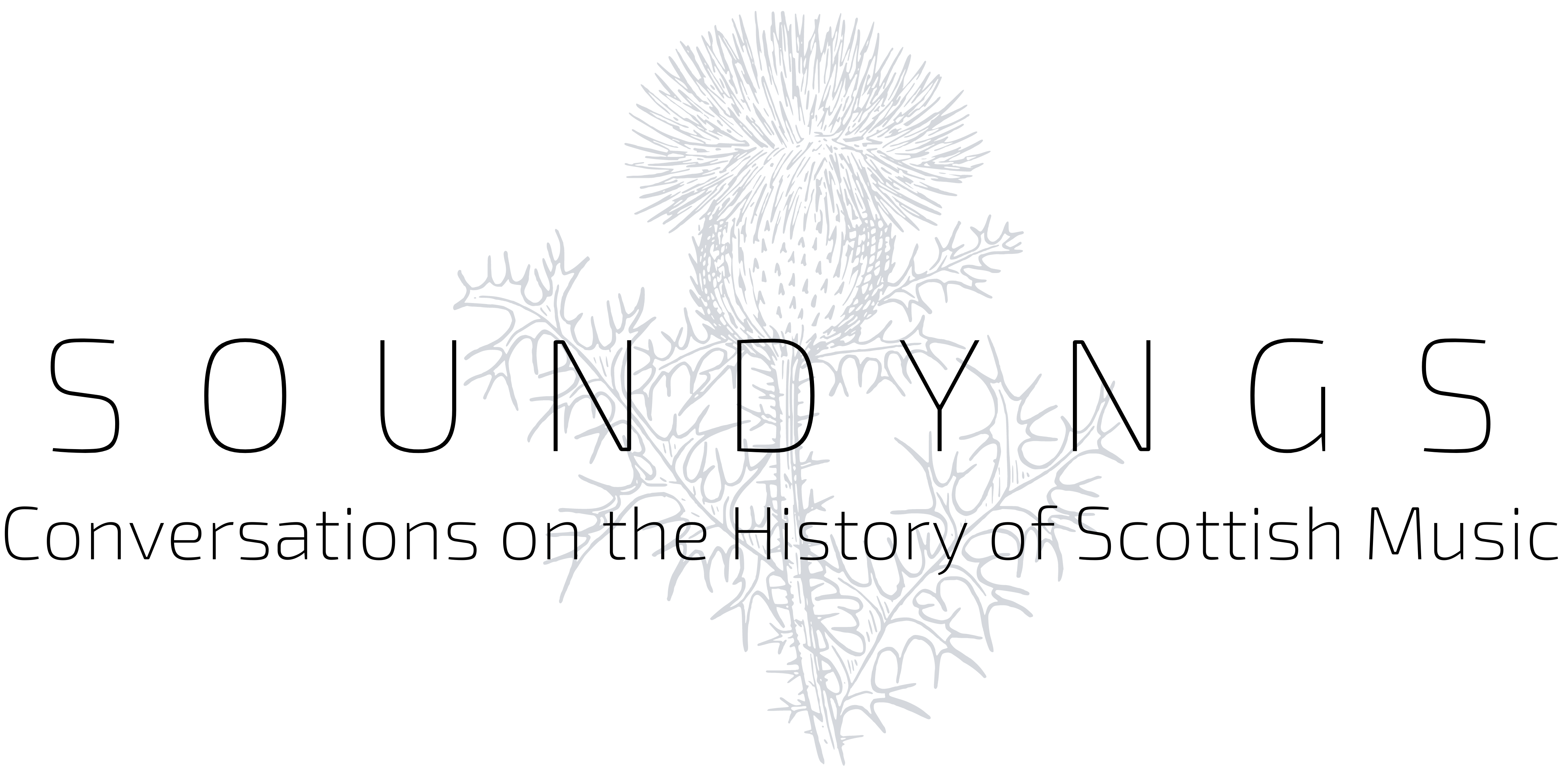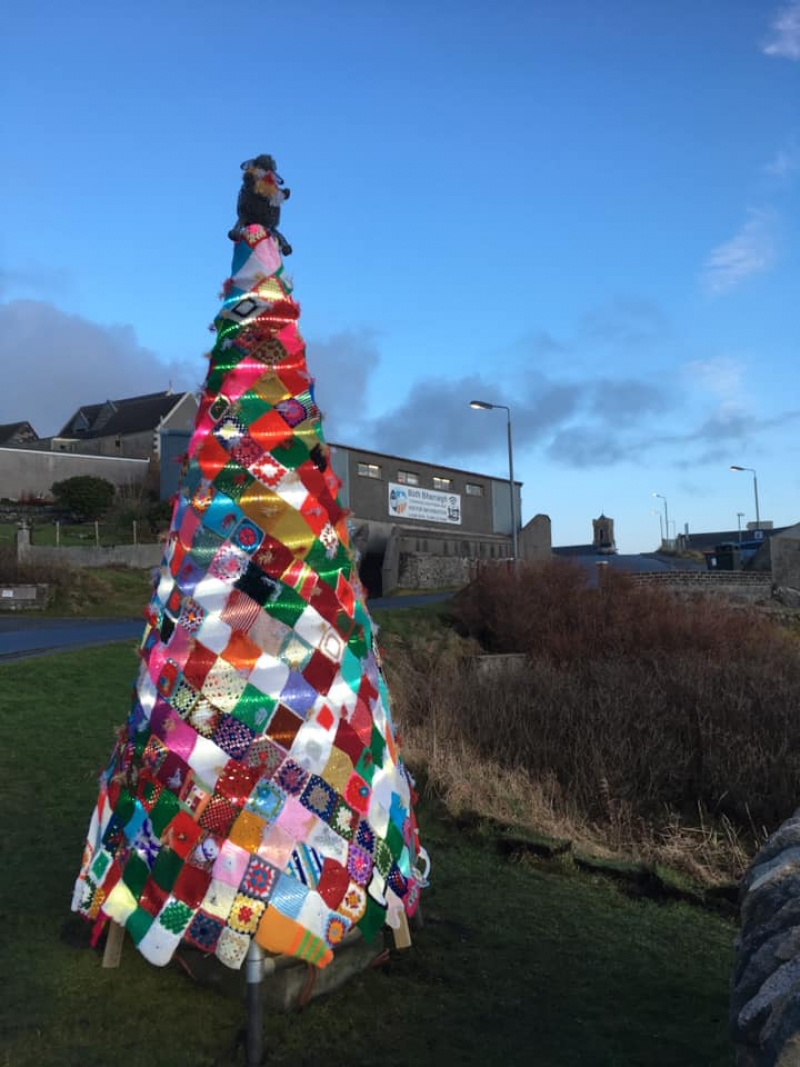Image: Castlebay, Barra’s, 2020 Christmas tree made by islanders who spent the Covid lockdown making squares for this wonderful thing.
While these days the aisles of Scottish supermarkets ring with Christmas songs from at least Hallowe’en, historically the Scottish Presbyterian church has a complicated relationship with Christmas (well, as in, not really having it, along with other holidays that the Reformers thought encouraged too much Roman Catholic association and worldly overindulgence to be properly Christian).
According to the Scottish writers carefully curated in a recent article by Kenneth Hodges, the 12 days of Christmas were invented by King Arthur in a rather desperate attempt to rebrand the winter carousing of his army in York as Christian rather than simply a pagan debauch. “The Romans gave you some days off for Saturnalia in midwinter”, said Arthur: “fair enough, have a full 12 days if you dedicate it to the birth of Christ”. “Huzzah!”, said the army (or its ancient Britonic equivalent). This, at least, was the myth recirculated by Geoffrey of Monmouth in the 12th century. Monmouth’s Historia Regum Britainniae (History of the Kings of Britain) also suggested that when Arthur came north to visit Scotland, he found the Pictish warriors to be brave, hardy fellow – so “huzzah” also for the ancient inhabitants of Caledonia.
Monmouth’s history was cited by early modern Scottish historians. Hector Boece wrote in his Scotorum historiae a prima gentis originae (1527) about the Arthurian roots of Christmas excess: in John Bellenden’s Scots translation of this work, York was ‘gevin to thair lust, sleip, ryottus bankettis & sensualitie” (p.30) (pretty much the wished-for state of most households, in December 2023). Building on these accounts, in the 16th and 17th centuries, Scottish Protestant Reformers found many reasons to object to the holiday. George Buchanan, tutor to James VI, wrote in Rerum Scoticarum Historia (1582) that the celebrations around Christmas ‘qua in re verius Bacchanaliorum lasciuia quam Christi tum nati memoriam referri satis constat’ [‘owed more to the Bacchanalia than to the memory of Christ’s birth’] (p.32). His nephew David Buchanan’s introduction to John Knox’s History of the Reformation in Scotland (1644) remarked of Arthur’s innovations, “thus was the beginning of the prophane idleness and ryot of Christmas, now kept twelve days with foolish excess and ryot” (p.26). And anyway, said the Reformers, Jesus wasn’t even born in December.
The Stuart court, however, had other ideas: James VI suggested in his Basilikon Doron (1599) that ‘good cheere at Christmas’ was all fair fun, alongside games in May and fish on Fridays (p.31). His son Charles I – who had little time for Scotland – went much further in condoning passtimes and expensive entertainments, and by the time David Buchanan was writing in 1644, Puritan resistance to Christmas was a minor part of a much longer list of grievances.
As a result of this Presbyterian opprobrium, for a long time, Christmas was celebrated quietly in the lesser-Reformed Gaelic-speaking corners of Scotland. However, in the early years of the 20th century, when Marjory Kennedy Fraser was collecting songs from the outer Hebrides, she included some Christmas carols in her Songs of the Hebrides (1909), ironically (given Calvinist histories of Christmas-grinchery) with the help of a Church of Scotland minister and poet, the Reverend Kenneth Macleod.
- The Christ Child’s Lullaby (Taladh Chriòsda).
Frances Wilkins has a great piece in Tobar an Dualchais summarising her recent research on the sacred song of the West Highlands and Western Isles. The lyrics nowadays associated with this carol are attributed in more rigorous histories than Kennedy-Fraser and Macleod’s to Father Ronald (Ranald) Rankin, a Roman Catholic priest, written for the children in his congregation as a farewell gift before he climbed on an emigration boat bound for Australia (see Further Reading, Tobar an Dualchais: read this piece for a longer account). The original tune was ‘Cumha Mhic Àrois’, possibly a waulking song; the similar (and possibly related) tune we know today was collected by Kennedy-Fraser in Eriskay and set to the words kept in circulation by a local Catholic priest. Read Wilkins to find out more about the transformations of the song as it moved through various processes of collecting and compilation.
Verse 1, and its translation by Kennedy-Fraser’s co-editor the Reverend Kenneth Macleod, is as follows:
Mo ghaol, mo ghàth, is m’endail thu,
M’iunntas ùr is m’ eibhneas thu,
Mo mhacan àlainn ceutach thu,
Cha’n fhiu mi fhein bi’d dhàil.
My love, my dear, my darling thou,
My treasure new, my gladness thou,
My comely beauteous babe-son thou,
Unworthy I to tend to thee.
- Christmas “Duanag” (that is, chant) (Duan Nollaig).
This song appears later in Songs of the Hebrides (p.159). Collected ‘from the chanting of Duncan Macinnes of Eriskay’, this sounds to my ears like a dance song, with a vigorous chorus about bannocks (oatcakes) – some kind of canntaireachd, perhaps? Huzzah! A note in Songs of the Hebrides on the term ‘air a vio (‘on the living’) suggests that it could also be heard as a charm, in the same way that many songs from Catholic Gaels are known to have been sung (taking inspiration from Alexander Carmichael’s Carmina Gadelica, 1900).
Here is the lyric in full, with (again) Macleod’s translation:
Heire Bannag, Hoire Bannag,
Heire Bannag, air a’ bheo
‘G innse duinn gu’n d’rugadh Criosd
Righ nan Righ, a tir na slaint
Mac na niula, Mac na neula,
Mac na runna, Mac na reula,
Mac na dile, Mac na deire, Mac na spire,
Mac na speura.
Hei-re Bannag, Hoire Bannag,
Hei-re Bannag, air a’ bheo,
Hei-re Bannag, Hoire Bannag, Heire Bannag, air a’ bheo.
Hey the Bannock, Ho the Bannock,
Hey the Bannock, air a vio [*on the living]
Telling us that Christ was born
King of Kings and Lord of Lords
Son of Dawn, Son of clouds,
Son of planets, Son of stars,
Son of rivers, Son of dew,
Son of welkin, Son of sky
(repeat Hey the Bannock …)
Listening
- Taladh Chriòsda has many recordings on Youtube. Here’s an Celtic-pipes, easy listening version from The Barra MacNeil’s Christmas Album (2011).
- Duan Nollaig – here’s an upbeat version by a joint venture from Cleveland, US group “Apollo’s Fire”, and Canadian Ensemble “Le Nef”, (Avie Records, 2012) Avie AV2269, which definitely sounds like it’s looking for a ceilidh.
Further Reading
- Alexander Carmichael, Carmina Gadelica, 2 vols (Edinburgh: Oliver and Boyd, 1900), subsequently more volumes over several decades edited by different people, from Carmichael’s collections.
- Kenneth Hodges, ‘How King Arthur Invented Christmas’ in Arthuriana 29(3), 2019, 25-42.
- Marjory Kennedy-Fraser and Kenneth Macleod, Songs of the Hebrides (Boosey & Hawkes, 1909) Taladh Chriosda (Christ Child’s Lullaby) and (Christmas Duanag)
- Frances Wilkins, “A Hebridean Christmas Tradition in the Hymn ‘Taladh Chriòsda’“, Tobar An Dualchais (2022)

